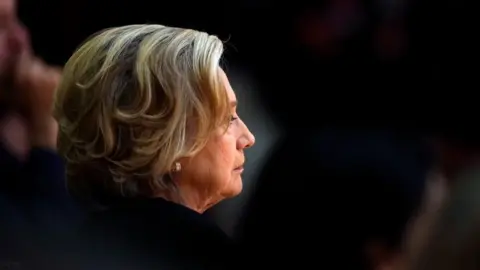Twitter blue tick: Multiple Hillarys and New Yorks as verifications disappear
 PA Media
PA MediaTwitter's removal of blue ticks is forcing accounts to find new ways to prove authenticity as concerns over copycats mount.
At the same time, Elon Musk has given blue ticks to a few celebrities who didn't ask for one, such as writer Stephen King.
And labels describing media organisations such as the BBC have disappeared.
Twitter insiders say it adds to the sense of chaos under Mr Musk.
The company has scrambled to suspend copycat accounts after the blue tick verifications - once a status symbol and a sign of authority - were culled.
An account posing as Sudan's paramilitary Rapid Support Forces (RSF) - which are currently battling the Sudanese army in a major power struggle - tweeted that its leader, Hemedti, had been killed.
Although the account is fake, it does have a blue tick - while the real account does not. Twitter's own public metrics indicated the tweet has been seen well oven a million times.
Within a few hours of losing verification, an account posing as Hillary Clinton, complete with the same profile picture as the former US senator, "announced" she would again run for the presidency. The account was suspended.
And in New York City, a new handle claimed to be the "authentic Twitter account" representing the local government - it was then suspended and the official account was forced to put out a statement.
Stephen King, with whom Mr Musk frequently interacts on Twitter, wrote: "My Twitter account says I've subscribed to Twitter Blue. I haven't." Mr Musk replied: "You're welcome namaste."
LeBron James also still has a blue tick, despite saying he would not pay to be verified.
On Friday morning, Mr Musk revealed he personally paid the Twitter Blue subscriptions for Mr King and Mr James. Star Trek actor William Shatner also got the same deal.
But celebrities such as Beyoncé and Cristiano Ronaldo have had their blue ticks removed.
Meanwhile some commentators have begun describing having a blue tick as embarrassing - "it's a signal you paid for it," wrote Cornell University Professor Kaushik Basu.
One fan account for Pakistan cricketer Babar Azam said Twitter had become a "funny place" where a "fan page has a Blue Tick but Babar Azam don't".
Other users noted the irony that actor Jason Sudeikis had lost his verification, while Ted Lasso, the fictional character he portrays, had not.
However company insiders have told the BBC that the upheavals put users at risk of harm.
Making blue ticks an $84 (£67) paid-for service will make it hard to distinguish real accounts from others impersonating them.
That's because blue verification ticks have long been the language used to communicate whether an account is who they say they are on Twitter.
Trusted news accounts did have gold ticks, but even those have disappeared - at least for now. Other high-profile accounts - like Pope Francis - now have grey ticks; others are tick-less. Twitter says the grey ticks are for governments or multilateral organisations and their officials.
Meanwhile some of the accounts that have bought blue ticks appear to be trolls or have a history of pushing disinformation. Because of the verified tick, users might be under the impression these accounts are trusted, and the posts they're sharing are sanctioned - but that will not always be the case.
In the case of a fake New York City government account, a lack of verification in such cases could be confusing at best and dangerous at worst.
For example, it could decide to share fake or misleading news about a public emergency or an extreme weather warning, conceivably putting people at risk.
So users may now need to dig deeper and look for other clues to spot who is genuine, such as old tweets or a high follower count.
The company first introduced the verification feature in 2009, after a former professional baseball player sued Twitter over imposter accounts.
Since acquiring Twitter in late 2022, Mr Musk has attempted to overhaul the social media company to turn a profit.
The decision to monetise verification could usher in a massive cultural and power shift on the platform.
Mr Musk has tried to frame the decision to do away with verification as a way to democratise content on the site. But critics have argued the move will amplify disinformation as Twitter Blue subscribers will get prioritised rankings - Mr Musk has said that only verified accounts will appear in the site's prominent For You stream.
Social media monitors and experts fear the rise in paid verification will lead to an amplification of misinformation on the site. If that were to happen, it could scare off yet more advertisers - and undermine any extra revenue Twitter is getting from its verification subscription model.
But Mr Musk said pain is a part of change.
"I feel like we're headed to a good place," he told BBC News. "Overall, I think the trend is very good."

Marianna Spring investigates how Elon Musk's ownership is transforming one of the world's most influential social media platforms.

